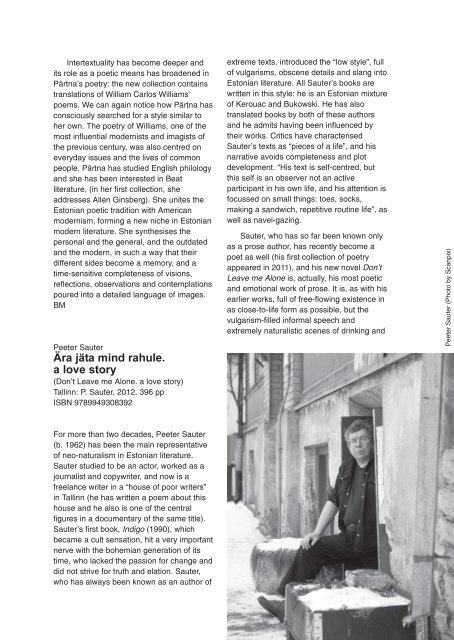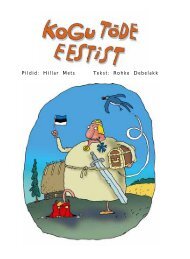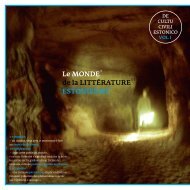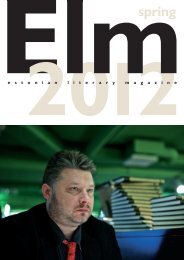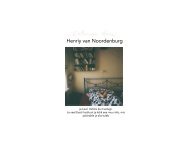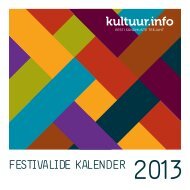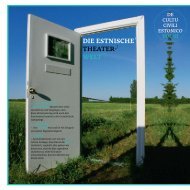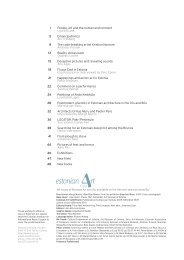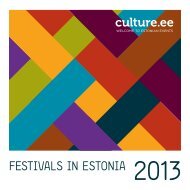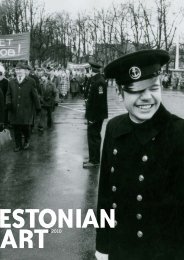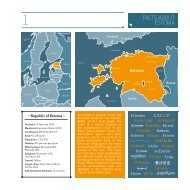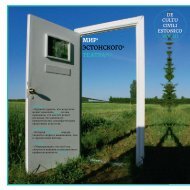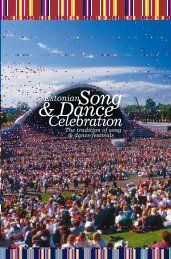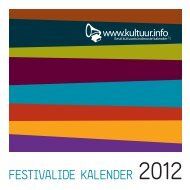Autumn 2013
Autumn 2013
Autumn 2013
You also want an ePaper? Increase the reach of your titles
YUMPU automatically turns print PDFs into web optimized ePapers that Google loves.
Intertextuality has become deeper and<br />
its role as a poetic means has broadened in<br />
Pärtna’s poetry: the new collection contains<br />
translations of William Carlos Williams’<br />
poems. We can again notice how Pärtna has<br />
consciously searched for a style similar to<br />
her own. The poetry of Williams, one of the<br />
most influential modernists and imagists of<br />
the previous century, was also centred on<br />
everyday issues and the lives of common<br />
people. Pärtna has studied English philology<br />
and she has been interested in Beat<br />
literature, (in her first collection, she<br />
addresses Allen Ginsberg). She unites the<br />
Estonian poetic tradition with American<br />
modernism, forming a new niche in Estonian<br />
modern literature. She synthesises the<br />
personal and the general, and the outdated<br />
and the modern, in such a way that their<br />
different sides become a memory, and a<br />
time-sensitive completeness of visions,<br />
reflections, observations and contemplations<br />
poured into a detailed language of images.<br />
BM<br />
Peeter Sauter<br />
Ära jäta mind rahule.<br />
a love story<br />
(Don’t Leave me Alone. a love story)<br />
Tallinn: P. Sauter, 2012. 396 pp<br />
ISBN 9789949308392<br />
extreme texts, introduced the “low style”, full<br />
of vulgarisms, obscene details and slang into<br />
Estonian literature. All Sauter’s books are<br />
written in this style: he is an Estonian mixture<br />
of Kerouac and Bukowski. He has also<br />
translated books by both of these authors<br />
and he admits having been influenced by<br />
their works. Critics have characterised<br />
Sauter’s texts as “pieces of a life”, and his<br />
narrative avoids completeness and plot<br />
development. “His text is self-centred, but<br />
this self is an observer not an active<br />
participant in his own life, and his attention is<br />
focussed on small things: toes, socks,<br />
making a sandwich, repetitive routine life”, as<br />
well as navel-gazing.<br />
Sauter, who has so far been known only<br />
as a prose author, has recently become a<br />
poet as well (his first collection of poetry<br />
appeared in 2011), and his new novel Don’t<br />
Leave me Alone is, actually, his most poetic<br />
and emotional work of prose. It is, as with his<br />
earlier works, full of free-flowing existence in<br />
as close-to-life form as possible, but the<br />
vulgarism-filled informal speech and<br />
extremely naturalistic scenes of drinking and<br />
Peeter Sauter (Photo by Scanpix)<br />
For more than two decades, Peeter Sauter<br />
(b. 1962) has been the main representative<br />
of neo-naturalism in Estonian literature.<br />
Sauter studied to be an actor, worked as a<br />
journalist and copywriter, and now is a<br />
freelance writer in a “house of poor writers”<br />
in Tallinn (he has written a poem about this<br />
house and he also is one of the central<br />
figures in a documentary of the same title).<br />
Sauter’s first book, Indigo (1990), which<br />
became a cult sensation, hit a very important<br />
nerve with the bohemian generation of its<br />
time, who lacked the passion for change and<br />
did not strive for truth and elation. Sauter,<br />
who has always been known as an author of<br />
E l m / A u t u m n 2 0 1 3


